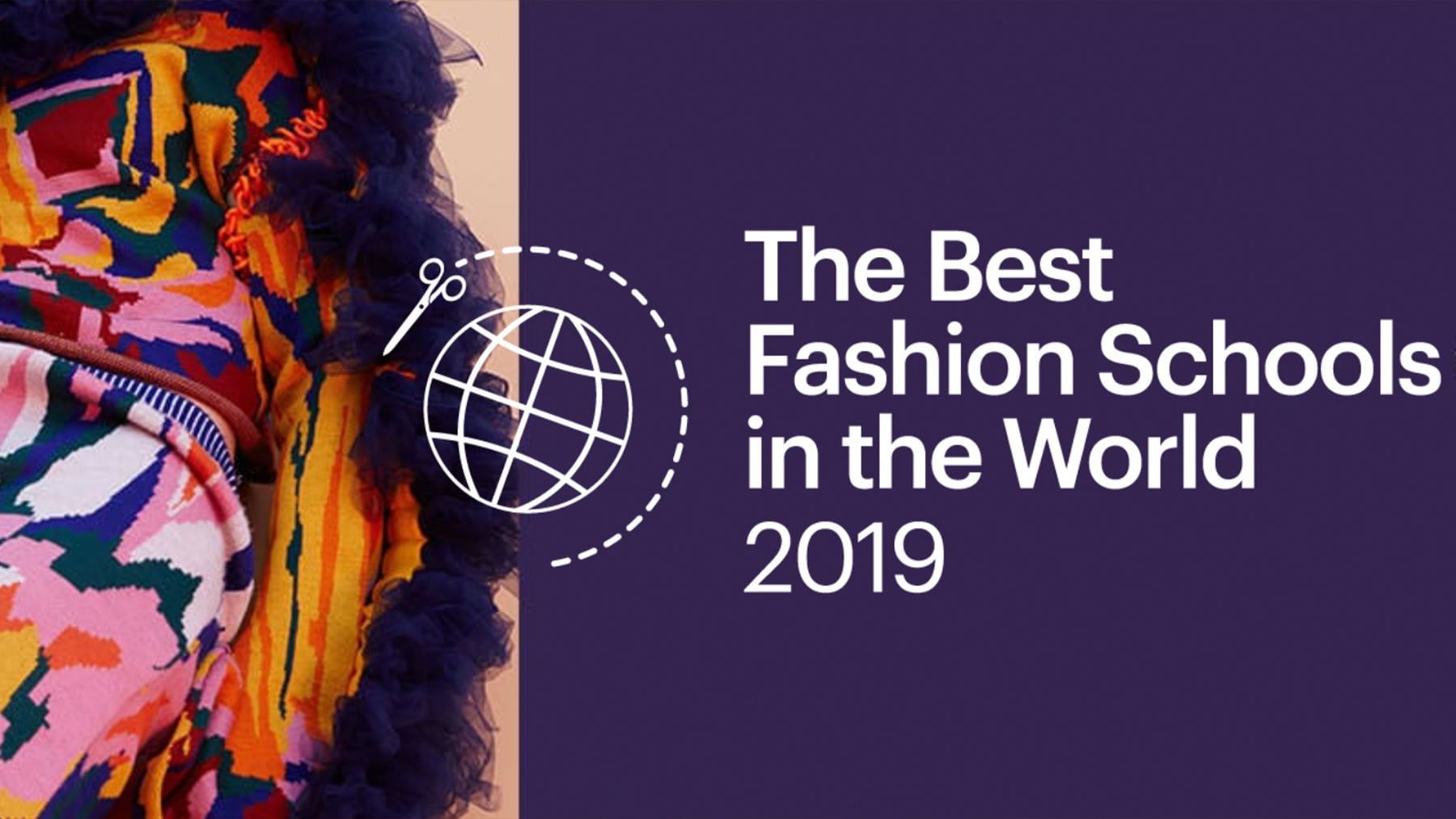
BoF’s Global assessment of fashion schools empowers prospective students to make the most informed decision about their education. The selection is fuelled by rigorous methodology and input from leading experts on the BoF Education Council.
In this article you can find the selection of best schools for Graduate – Fashion Design.
Explore BoF’s full report on The Best Fashion Schools in the World 2019 and the new methodology here.
Read the introduction of this assessment here.
Aalto University, School of Arts, Design & Architecture
Helsinki, Finland
Best in: Best in global influence.
- Average cohort size: 29
- International students: 26%
- Acceptance rate: 29%
- Tuition domestic/intl: $0k/$17k
- Degrees offered: MA Fashion, Clothing & Textile Design
The Helsinki school fosters a culturally rich environment with its close proximity to international institutions, approaching fashion from a cross-disciplinary angle.
Collaborative learning is the guiding philosophy behind the Aalto School of Arts, Design and Architecture MA design programmes, encouraged by its Aalto Platforms among other university communities, such as the Experience, Entrepreneurship and Materials platforms that bring together research from various fields. Coursework is multidisciplinary, pairing fashion with other topics including biomaterials, media studies and management. Students work in a mix of studio based, individual and theoretical classroom work, with 24-hour access to all studios. A focus on new materials and technologies informs student’s work, which is exhibited in Finland and abroad, at events including the Festival d’Hyres, LVMH graduate prize, Designer’s Nest Copenhagen, the Granary 1 showroom in London and the Aalto showroom during Paris Fashion Week. Students participate in ongoing projects with industry partners, such as H&M and the Icepeak/Luhta Sportswear company.
Rome, Italy
Best in: Best overall, Best in global influence, Best in learning experience, Best in long term value.
- Average cohort size: 11
- International students: 55%
- Acceptance rate: 30%
- Tuition domestic/intl: $17k/$24k
- Degrees offered: MA Alta Moda – Fashion Design, MA Creative Knitwear Design
Nestled in the heart of Rome, the faculty scopes out the historical framework of fashion through specialist learning resources.
Accademia Costume & Moda focuses on research and personal experimentation, encouraging students to analyse the cultural context and role of Italian products in the global market. The one-year master’s programme equips students with in-depth technical understanding of fabrics, supplements studies with “live-brief” visits to local factories, providing students with real-life exposure and support with over 80 industry partners. Postgraduate courses are taught both in English and Italian, and students have access to a faculty library housing over 5,000 books and 10,000 fashion magazines. The school’s Creative Knitwear Design course is an exclusive partnership with Modateca Deanna, home to an archive which includes pieces by Joseph Kenzo, Valentino and Yves Saint Laurent. Thanks to its location in Rome and proximity to Milan, students are also connected to the fashion industry through numerous alumni events.
Bunka Fashion Graduate University
Tokyo, Japan
Best in: Best overall, Best in global influence, Best in learning experience.
- Average cohort size: 63
- International students: 80%
- Acceptance rate: 58%
- Tuition domestic/intl: $14k/$14k
- Degrees offered: MA Fashion Design
Riding the incoming wave of Japanese fashion, the graduate school fills the gaps between untapped local talent and the international market.
The first and only professional fashion graduate school in Japan, Bunka Fashion Graduate University offers two majors in fashion creation and management. The school plays an active role in its community in partnerships with public agencies including the Ministry of Foreign Affairs of Japan, Iwate Prefecture Government, Nigata Prefecture Government and the tourist association of Shinjuku-ku Tokyo. The graduate curriculum centres on training students to become fashion business leaders by the end of the two-year programme. Now in its 13th year since its establishment, students have completed past projects including collaborations with H&M and Japanese school uniform makers. Through educating students with a business sense, the faculty aims to enrich Japan’s role in the global market, with graduates going on to establish their own brands and businesses. It also provides new employee training for brands including Comme des Garçons. Alumni of the university work in the domestic and international fashion market for influencers such as Yusuke Takahashi, the designer of Issey Miyake Men.
Central Saint Martins
London, United Kingdom
Best in: Best overall, Best in global influence, Best in learning experience, Best in long term value.
- Average cohort size: 53
- International students: 54%
- Acceptance rate: 8%
- Tuition domestic/intl: $14k/$25k
- Degrees offered: MA Fashion
CSM carries a long legacy of developing international fashion talent at the heart of the fashion hub London.
With an acceptance rate of just 6 percent, Central St Martins’ BA Fashion Design programme is one of the most exclusive in the world. A constituent college of the University of the Arts London, CSM is a key player in London’s fashion scene and has trained some of the biggest names in the industry, including, on average, over half of all designers on show at London Fashion Week. Prominent graduates include Alexander McQueen, Phoebe Philo, John Galliano and Christopher Kane, to name a few. CSM offers undergraduate students an elective Diploma in Professional studies, which comprises one year of industrial placement with hosts in fashion capitals across the globe. The school’s annual White Show — entirely conceived, created and managed by first-year students — sets the tone for hands-on experience and close collaboration between fashion design and communications students.
PLEASE NOTE THIS ASSESSMENT WAS COMPLETED WITHOUT THIS SCHOOL’S ACTIVE PARTICIPATION
Domus Academy
Milano, Italy
Best in: Best in learning experience.
- Average cohort size: 27
- International students: 81%
- Acceptance rate: 87%
- Tuition domestic/intl: $23k/$31k
- Degrees offered: Academic Master in Fashion Design
The graduate design faculty adopts a free curriculum approach, customising course structures to suit individual design aspirations.
At Domus Academy, based in Milan, the year-long Master’s Fashion Design curriculum is designed around a project-based approach, with 8-week modules each operated in collaboration with a fashion company, and no set syllabus to allow for a customisable education experience. The first two modules are core; the third and fourth elective; and the fifth a 2-month internship or mentorship programme where students create their collection. Surveyed students reported high levels of satisfaction with the breadth and curriculum of learning. Domus’ Master’s Fashion Design course is taught in English and has yearly themes, which change the projects annually. In 2018, the themes included waste, nurture and trans-local. The Fashion Design course also included a 48-hour design marathon with Reebok, which involved designing shoes and apparel for the year 2030. The programme has also partnered with the likes of Versace, Nike and MaxMara.
Donghua University
Shanghai, China
Best in: Best overall, Best in global influence, Best in learning experience, Best in long term value.
- Average cohort size: 75
- International students: 3%
- Acceptance rate: 11%
- Tuition domestic/intl: $2k/$4k
- Degrees offered: MA or MDes, Clothing & Apparel Design
The university has gained a global resonance as one of the first bridges of local designers and the international fashion market.
Established in 1951, Donghua University, situated in western Shanghai, is a public research university teaching fashion, textile, material science and management. Its School of Fashion and Art Design has its roots in the Department of Textile Engineering, which began recruiting undergraduates in 1982. A year later, the Clothing Education and Research Office was opened, becoming one of the first higher learning institutions in China to establish a fashion discipline. Donghua collaborates with all sectors of the industry in research and consultancy activities, conducting school visits and roundtables with clients, including Chaber, Novéli, Swarovski and Decathlon. Students have also taken part in Shanghai Fashion Week, with support from companies like WGSN. The Fashion and Art Design school recruits around 160 graduate students each year, and its acceptance rate of 11 percent makes it one of the most exclusive MA design programmes on BoF’s list.
Philadelphia, United States
Best in: Best overall, Best in learning experience, Best in long term value.
- Average cohort size: 7
- International students: 38%
- Acceptance rate: 39%
- Tuition domestic/intl: $28k/$28k
- Degrees offered: BS Fashion Design
A part of the Westphal College of Media Arts & Design, the university analyses design from technology, business and merchandising touchpoints.
As part of a large private research university in Philadelphia, Pennsylvania, Drexel University’s MS Fashion Design programme accepts students from a variety of design and non-design undergraduate disciplines, including sciences, information design and education, in an effort to produce diverse perspectives from its fashion students. The cooperative education programme also emphasises practical, hands-on experience, partnering with companies including Macy’s, Michael Kors and Ralph Lauren for student internships. Drexel University is also home to the Shima Seiki Haute Tech Lab, founded in 2012, which contains 16 workstations and three state-of-the-art knitting machines, donated by machine manufacturer Shima Seiki, a world leader in 3D computerised knitting systems. Students and alumni reported high levels of satisfaction with Drexel’s available resources.
Paris, France
Best in: Best in long term value.
- Average cohort size: 19
- International students: 81%
- Acceptance rate: 57%
- Tuition domestic/intl: $15k/$15k
- Degrees offered: MA Creative Director
Technical ability meets creative innovation at the French fashion school situated within a mosaic of industry networks.
ESMOD International’s Creative Director graduate programme, taught only at its Paris campus, is entirely focused on professional training, emphasising preparing students to launch their own brand or obtain a management position on a brand’s creative team. The programme lasts 2 years, with the last year consisting of required professional immersion in the design and business departments of a fashion company. The internship is followed by a dissertation on that experience, which students present to a jury as a final project. Students must have completed 3 years of a BA in Fashion Design & Creation to apply for this course, although with an acceptance rate of 57 percent, ESMOD is one of the least exclusive MA design programmes on BoF’s Best Fashion Schools in the World. Students and alumni show remarkably high satisfaction with the school’s alumni network, with all four indicators at 100 percent.
Paris, France
Best in: Best overall, Best in global influence, Best in learning experience, Best in long term value.
- Average cohort size: 19
- International students: 89%
- Acceptance rate: 25%
- Tuition domestic/intl: $11k/$16k
- Degrees offered: MA Fashion Design
A staple in the fashion capital Paris, the faculty is an esteemed junction of French technical craftsmanship and the luxury fashion industry.
Anchored in the Parisian fashion ecosystem, the Institut Français de la Mode’s Fashion Design MA programme is a 2-year course taught in English, with personalised individual career coaching and a 6-month internship and projects with companies the school has close ties, including Chanel, Chloé, Hermès, Louis Vuitton and Dior. The institute also offers a 1-year course, Advanced Intensive Programme in Fashion Design and Pattern Making, taught in French. Students and alumni reported a 100 percent satisfaction rate with the course meeting their overall educational objectives, as well as high satisfaction with all aspects of teaching and the calibre and diversity of the student body.
Milano, Italy
Best in: Best overall, Best in global influence, Best in learning experience.
- Average cohort size: 171
- International students: 85%
- Acceptance rate: 38%
- Tuition domestic/intl: $32k/$36k
- Degrees offered: Master’s Fashion Design Womenswear, Master’s Fashion Design Menswear, Master’s Fashion Design Collection & Marketing
For over 80 years, the faculty has built its legacy in comprehensive fashion education across the globe.
Istituto Marangoni has nine campuses worldwide offering courses in Italian, English and French, and its Fashion Design MA programme is offered in Milan, Florence, Paris and London. Istituto Marangoni’s MA Design programme is projects-based and culminates in a dissertation project that includes a capsule fashion collection. The MA programme also boasts small classes and a minimum of 15 contact hours a week with its tutors, so that the curriculum can be tailored to each student. Marangoni has an average full-time student cohort size of 171, which makes it the largest MA Design programme on BoF’s Best Fashion Schools in the World list. Many students travel overseas to set up their own labels or are employed in the fashion industry upon graduation, but the school notes an increasing number of graduates considering academic progression in MAs in Philosophy or PhD studies.
London, United Kingdom
Best in: Best overall, Best in global influence, Best in learning experience, Best in long term value.
- Average cohort size: –
- International students: 59%
- Acceptance rate: 32%
- Tuition domestic/intl: $14k/$25k
- Degrees offered: MA Fashion, MA Fashion Design Technology Menswear, MA Fashion Design Technology Womenswear
A key player in the London fashion ecosystem, the faculty offers fashion programmes in the realm of fashion technology, business and media.
London College of Fashion’s MA Fashion Design programme offers a range of projects, partnerships and programmes that focus on collaboration, industry experience and innovation. As a part of the University of Arts London, students have access to a wide network of resources, including libraries, cross-college talks, exhibitions and workshops with other leading arts colleges. The programme includes a collaborative unit, which gives students the opportunity to explore marketing plans, sustainability projects and production methods in partnership with companies like Net-a-Porter, Tom Ford Beauty and Diesel. Students have the opportunity to apply and compete for numerous awards, including the LCF’s Better Lives Initiative and the Kering Award for Sustainable Fashion. Students and alumni showed high satisfaction with the programme’s available resources, quality of teaching, and career services.
PLEASE NOTE THIS ASSESSMENT WAS COMPLETED WITHOUT THIS SCHOOL’S ACTIVE PARTICIPATION
National Institute of Design Ahmedabad
Ahmedabad, India
Best in: Best in global influence.
- Average cohort size: 15
- International students: 0%
- Acceptance rate: 2%
- Tuition domestic/intl: $5k/-
- Degrees offered: MDes Apparel Design
The first institute of design in India situates fashion education within the context of functionality and national design principles.
The National Institute of Design in Ahmedabad was established in 1961 as India’s the first design school. The school’s Apparel Design programme encourages interdisciplinary projects, industry experience and community engagement. The two-and-a-half-year programme introduces a number of collaborative projects to students in all stages of their practice. Recently students worked with embroidery and appliqué crafts artisans in Sadhna, Udaipur, learning traditional design and sustainability practices. Notable NID alumni include Rahul Mishra and Nachiket Barve, whose namesake brands are known to recruit the school’s MDes Apparel Design graduates. As one of the most competitive programmes on the list, NID’s apparel design programme only accepts 15 students a year, stressing its Bauhaus philosophy of community-focused teaching dynamics and personal relationships and mentorship with faculty and advisors. Although 90 percent of graduates find employment within 12 months of finishing the programme, students and alumni report low levels of satisfaction with regard to NID’s career services.
Florence, Italy
Best in: Best overall, Best in learning experience, Best in long term value.
- Average cohort size: 52
- International students: 90%
- Acceptance rate: 39%
- Tuition domestic/intl: $31k/$31k
- Degrees offered: Collection Design, Fashion Design, Creative Direction, Knitwear Design
The Italian faculty is a seedbed for European fashion industry key players with a global resonance.
Polimoda’s 9-month MA Fashion Design programme offers a practical, industry-focused approach to luxury design. The programme is a part of Polimoda’s double master programmes, combining fashion design with fashion marketing & communications and bag or shoe design. The programme is textile based, but includes workshops for drawing and illustration techniques that can be applied to a variety of design practices. Polimoda also offers industry course partnerships with brands like Valentino and Salvatore Ferragamo, as well as company projects with partners like Max Mara, Loro Piana, Inseta and Pitti Immagine. To further students’ understanding of the industry, the programme includes access to exclusive experiences included in its tuition costs, allowing them to attend the Venice Biennale and Paris Fashion Week. These events allow students to meet with and have one-on-one instruction from fashion figures including Walter Van Beirendonck, Etienne Russo, Robin Meason and Olivier Saillard.
Royal College of Art
London, United Kingdom
Best in: Best overall, Best in global influence, Best in learning experience, Best in long term value.
- Average cohort size: 106
- International students: 69%
- Acceptance rate: 25%
- Tuition domestic/intl: $12k/$36k
- Degrees offered: MA Fashion Menswear, MA Fashion Womenswear
The world’s oldest art and design university provides multifaceted fashion education with historical roots to London’s fashion industry and beyond.
Founded in 1837, the Royal College of Art is one of the oldest art and design universities in operation and its Fashion Design programme has deep connections to industry. The college offers students a variety of partnerships with brands like Adidas, Swarovski and Burberry, allowing students to speak with business leaders, network with professionals and develop skills and applications for after graduation. For example, Adidas previously worked with first-year students on a football project, leading three students to spend a summer at the brand in Germany. The programme operates numerous projects and competitions to encourage interdisciplinary collaboration, including a BIO-Design challenge led by a Microsoft fashion and technology expert, allowing five students to work with those studying Architecture to Design Engineering. Surveyed students were highly satisfied with the programme’s resources and reported 100 percent satisfaction that their overall educational objectives were met.
PLEASE NOTE THIS ASSESSMENT WAS COMPLETED WITHOUT THIS SCHOOL’S ACTIVE PARTICIPATION
Savannah, Georgia, United States
Best in: Best in long term value.
- Average cohort size: 26
- International students: 66%
- Acceptance rate: 34%
- Tuition domestic/intl: $38k/$38k
- Degrees offered: MA Fashion, MFA Fashion
World class craftsmanship is crossed with cutting-edge technology, with campuses located on three different continents.
Founded in 1978, Savannah College of Art and Design’s fashion design programme offers state-of-the-art facilities and partnerships with cutting-edge companies. Students enrolled in the school’s fashion programmes were the largest winners of fashion scholarship money and awards in the US. The school’s SCAD Gulfstream Centre for Design features 3D programs, a five-axis computer numeric control router, a three-axis CNC milling machine, rapid prototypers and laser cutters for students to conceptualize and produce designs. The programme also encourages the use of motion media and animation software for student proposals and presentations. Emphasizing mentorship through its Style Lab program, the programme allows students to work with designers like Zac Posen, Christian Siriano and Chris Benz in a year-long mentorship initiative. SCAD boasts that within 10 months of graduation, fashion design students were employed, pursuing further education or both.
Swedish School of Textiles, University of Borås
Borås, Sweden
Best in: Best overall, Best in learning experience.
- Average cohort size: 16
- International students: 63%
- Acceptance rate: 26%
- Tuition domestic/intl: $0k/$26k
- Degrees offered: MA Fashion Design, MFA Fashion Design
Located in the Swedish textile fashion centre, the faculty combines art and science in its approach to fashion.
Established in 1866, the Swedish School of Textiles at University of Borås takes a unique approach to design and technology. The faculty offers full-scale industrial spaces for large scale experiments, 3D knitting equipment, a textile design lab to develop innovative textiles using technology and its Re:Textile programme, which focuses on creating circular flows in the textile industry by partnering with the regional industry. The MA programme is centred around artistic work, branching into multiple specialization avenues such as knit, print and performance wear, chosen by each student. Practice-based studies and guest lectures by the likes of Glenn Martens from Y/ project inform the final collections, also presented at the Dutch Design Week. Students also partake in exchange programmes to faculties such as RMIT in Melbourne, PolyU in Hongkong and Bunka Fashion College in Tokyo. The high teacher to student ratio encourages mentorship with a tight-knit collaborative environment. Students and alumni reported high satisfaction with the available resources and technology.



